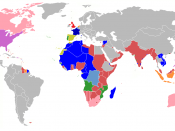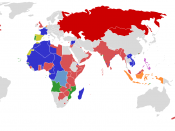Colonization has been used throughout history as a means of expansion in the pursuit of profits and power. The effects of colonization through the view of the colonizers were one of liberation and progression. They viewed their practices, and needs as the top priority and justified it through their ethnicity, religion and technological advancement. For the colonized their structure of society and their lifestyle were essentially overhauled by the colonizers. The economic, social and cultural effects of such change are visible in today's society. The current economic and societal globalization is an advent of past colonization. The relationship between colonizers and the colonized is still reflected in present day society, and can be more promptly viewed in the economic, social and cultural changes.
The economics effects of colonialism began with the introduction of the capitalist system to the colonies. Pre-colonial nations did not produce more then what they needed nor did they produce a surplus.
However colonization changed the economic system in order to garner surpluses for the ruling elite and the provincial ruler. As such, under colonialism, third world countries were obliged to produce for European needs as well as for their own in order to obtain currency. This currency was needed to pay the taxes imposed on them by the colonisers and to buy European goods (Bernstein, Johnson and Thomas, 1992, p.192). As Europeans took over land and which had previously not been owned by individuals, and introduced property systems, money was also needed for rent or purchase of land (Bernstein, Johnson and Thomas, 1992, p.198). In this way, European currency began to be used in the economies of the third world, some of which had been formally based on barter. Colonialism was the beginning of the world currency system prevalent today.
In addition the capitalist system created...


